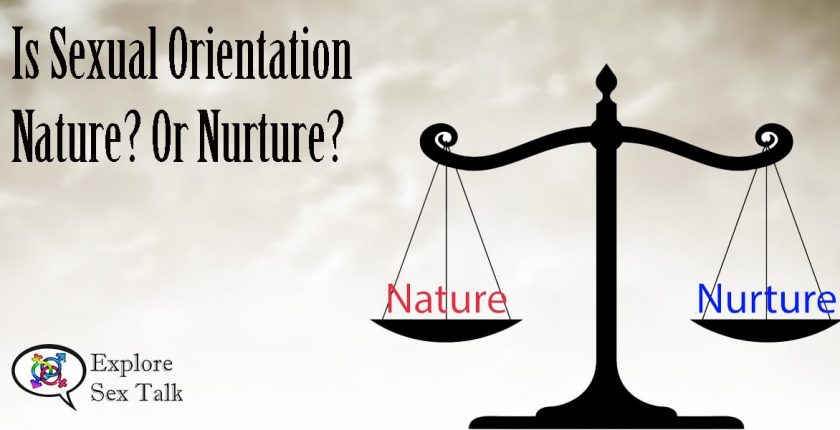Join our Mailing List
*We will NOT sell your information. All your information is kept private within Explore Sex Talk. You can unsubscribe at any time


Have you ever wondered if our sexual orientation is nature or nurture? The debate over sexual orientation is far from being a settled issue for many people. It’s a topic of heated debate and a lot of scientific exploration. At this point, we cannot pinpoint the exact roots of influence on sexual attraction. There are a lot of different theories and some really compelling evidence but it’s not a closed case just yet.
The discussion on sexual orientation really began with psychologists, sociologists, and biologists trying to explain heterosexual behavior. It was once believed that homosexuality was a psychological disorder despite its prevalence through history and the animal kingdom. People thought it was an abnormality or aberration. Given the lack of social acceptance of the time, it is more likely that those who were not heterosexual simply concealed who they were than face the consequences of the being discriminated against.
In 1957, Karen Hooker studied the link between homosexuality and the development of mental illness. Her study examined a variety of individuals using a wide range of criteria such as age and IQ. The study subjects were given three psychological tests: the Rorschach, Thematic Apperception Test, and the Make-a-Picture-Story Test. Her study found absolutely no statistically significant differences between the groups. Her study concluded that there is no correlation between social determinism and sexuality. Her findings led to the removal of homosexuality from the Diagnostic and Statistical Manual of Psychological Disorders in 1973.
As we have continued to explore the matter, it became increasingly clear that homosexuality is not a mental disorder or moral depravity. Our growing understanding has led the research into exploring the ways humans develop our sexuality and sexual attraction.
While there are still some who believe that sexual orientation is a matter of nurture, these theories hold little support. Most psychological and social arguments look closely at the influence of parents and family dynamics. Behaviorists believe that some gender and sexual identity comes from roles imposed upon by the family and friends. Things like gender stereotypes are believed to play a crucial role. While there is some support that the values that parents raise children with can influence their feelings of security to embrace who they are or not, there is extremely thin support for these influences actually impacting the final outcome of someone’s sexual orientation.
So if it’s not nurture, is it nature?
There have been some extremely compelling studies that suggest a strong biological link to sexual orientation. Scientists studying the anatomical structures of the brain of heterosexuals and comparing them to homosexuals show some distinct biological differences. In some cases, a portion of the hypothalamus of the brain was actually structurally different in the brain of a homosexual. The hypothalamus has been linked to our sex drive and function in other research.
Other research has looked at the differences in neuroendocrine evidence. The research has explored this link with rats. Changes in exposure to androgens at different levels of development have shown to change the sexual behavior in rats. Adult female rats that were given a high level of androgens early in their development ended up showing higher levels of aggression and sexual attraction to other females. Male rats that received low levels in early development ended up being receptive to sexual approaches from other males.
Some of the most compelling evidence on the nature of sexuality comes from studies conducted with identical twins that were raised apart. This research has found that if one twin was homosexual, there was a high percentage chance that the other twin identified as homosexual as well. One scientist, Dean Hamer, even examined DNA samples from homosexual men and found what he described as a “remarkable concordance” for five genetic markers on a section of the X-Chromosome.
While we can’t definitely say that sexual orientation isn’t a choice, the evidence is extremely compelling. It is likely that we will eventually be able to make the undeniable link to biology. The only difference that nurture seems to have is a person’s feelings of self-esteem and security in who they are. Those who are shamed for their sexuality are likely to struggle with it. Embracing who we are makes a huge difference in our happiness as well as our ability to develop healthy relationships.
Enjoyed this article? Show some love and share it! You can also show us some love by leaving us a testimonial! If you never want to miss one of our new and fabulous articles, join our mailing list. Our regular posts can help you build your knowledge to improve your sex life and have better relationships. If you really want to up your sex game, you can join our Sexy Hero Society for exclusive content. If you’re looking to improve your knowledge in a specific area, you can also check out what we currently have available for online courses. We also have some thought-provoking as well as scandalous items in our online shop where your patronage helps us fund future research. So how do you want to grow your sex skills? Choose what works for you and make your mark!
Session expired
Please log in again. The login page will open in a new tab. After logging in you can close it and return to this page.
Join our Mailing List
*We will NOT sell your information. All your information is kept private within Explore Sex Talk. You can unsubscribe at any time

